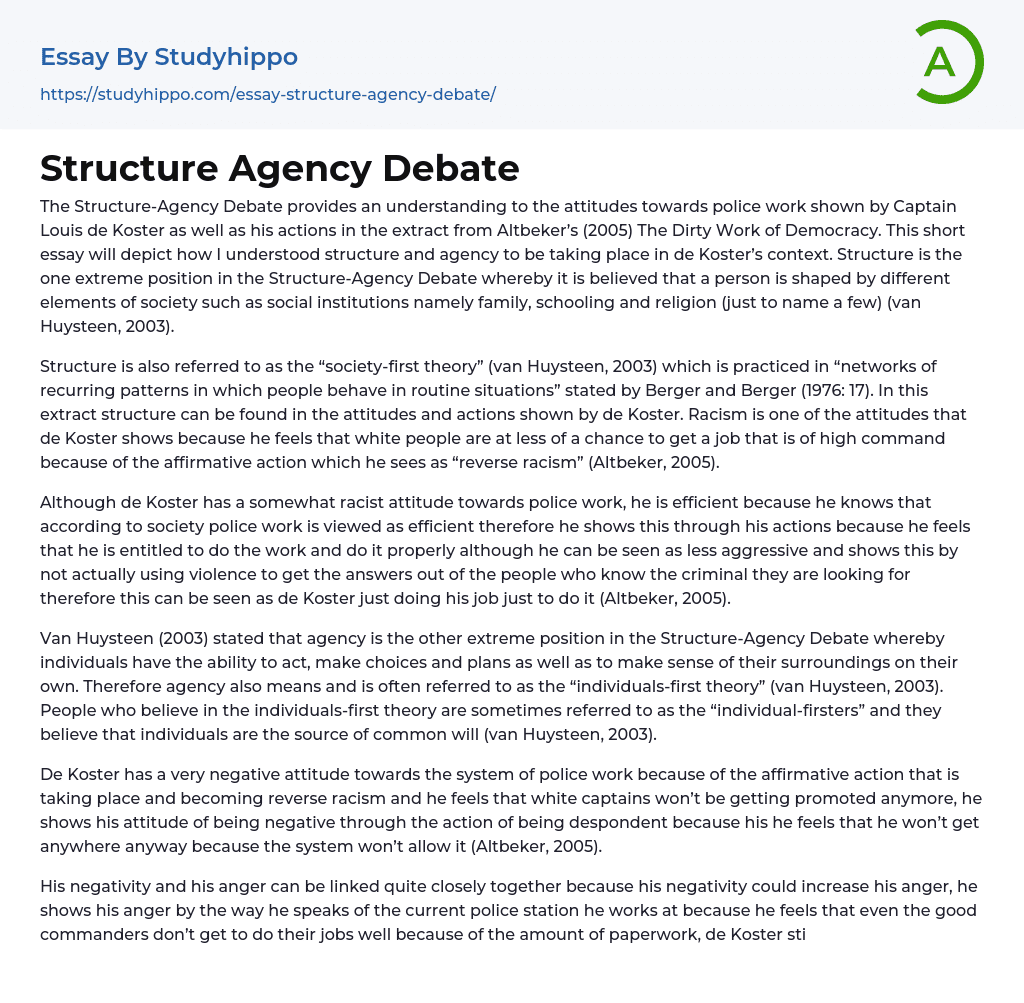In the extract from Altbeker's (2005) The Dirty Work of Democracy, Captain Louis de Koster's attitudes towards police work and his actions can be understood through the Structure-Agency Debate. This essay will explain how structure and agency are at play in de Koster's context. Structure, one extreme position in the Structure-Agency Debate, suggests that individuals are influenced by various elements of society, including social institutions like family, schooling, and religion (van Huysteen, 2003).
The concept of structure, also known as the "society-first theory" (van Huysteen, 2003), is characterized by networks of recurring patterns in which people exhibit routine behaviors (Berger and Berger, 1976: 17). In this excerpt, one can observe structure in the attitudes and actions displayed by de Koster. One such attitude is racism, as de Koster believes that white individuals have a lesser chance
...of obtaining high-level job positions due to affirmative action, which he perceives as "reverse racism" (Altbeker, 2005).
Despite de Koster's somewhat racist attitude towards police work, he displays efficiency by recognizing that society views police work as efficient. He demonstrates this through his actions, believing that he is entitled to perform the job properly. Although he is perceived as less aggressive, he refuses to resort to violence when interrogating individuals who may know the criminal they are searching for. As a result, de Koster can be seen as simply carrying out his duties without unnecessary force (Altbeker, 2005).
According to Van Huysteen (2003), agency is a position in the Structure-Agency Debate that emphasizes individuals' ability to act, make choices, and understand their surroundings independently. This perspective is also known as the "individuals-first theory" (va
Huysteen, 2003). Supporters of the individuals-first theory, also called "individual-firsters," believe that individuals are the origin of common will (van Huysteen, 2003).
De Koster expresses a pessimistic view of the police work system due to the implementation of affirmative action, which he perceives as reverse racism. He believes that white captains will no longer be promoted, leading to feelings of despondency as he believes his career progress will be hindered by the system (Altbeker, 2005).
His negativity and anger are closely linked, as his negativity can intensify his anger. He expresses his anger through talking about the police station where he works, believing that even competent commanders are unable to effectively perform their duties due to excessive paperwork. De Koster maintains his pride by doing his job in his preferred way, solely focused on accomplishing tasks (Altbeker, 2005).
The structure in de Koster's context has greatly influenced his attitude towards his job and the actions he takes as a policeman, ultimately shaping his character.
- A Policeman essays
- Ambition essays
- Anger essays
- Betrayal essays
- Boredom essays
- Confidence essays
- Courage essays
- Desire essays
- Disgrace essays
- Doubt essays
- Empathy essays
- Fairness essays
- Fear essays
- Feeling essays
- Forgiveness essays
- Grief essays
- Guilt essays
- Happiness essays
- Harmony essays
- Hate essays
- Honesty essays
- Honor essays
- Hope essays
- Humanity essays
- Inspiration essays
- Kindness essays
- Laughter essays
- Loneliness essays
- Lost essays
- Loyalty essays
- Need essays
- Passion essays
- Pressure essays
- Pride essays
- Regret essays
- Respect essays
- Responsibility essays
- Sarcasm essays
- Shame essays
- Suffering essays
- Suspense essays
- Tolerance essays
- Agreement essays
- Business Law essays
- Common Law essays
- Community Policing essays
- Constitution essays
- Consumer Protection essays
- Contract essays
- Contract Law essays




